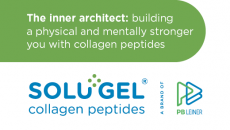Seven Seas in choppy waters over health claim use in skin supplement ad

The claim, made by vitamin and supplement specialists Seven Seas, refers to its Perfect 7 Renewal Advanced supplements, which the firm claim is a “unique formulation containing ceramosides. A natural source of ceramides, for more hydrated looking skin, from within”.
The ad, which appeared on 21 October 2018, features text positioned over a women’s cheek, also states, “wrinkles appearance reduction, skin firmness, skin moisture, skin smoothness. Skin elasticity, skin radiance and skin softness”.
Provide robust evidence
Upholding the final decision, ASA instructed Seven Seas not to use the ad in its current form instructing the firm to “ensure that their future advertising did not include specific health claims that were not authorised on the EU Register and to ensure that they held robust evidence to substantiate cosmetic claims”.
Seven Seas, an affiliate of multinational consumer goods corporation Proctor and Gamble, responded by saying both of these were cosmetic claims.
They provided a copy of a randomised clinical trial, which they believed, substantiated the claims “skin moisture” and “for more hydrated skin, from within”.
The firm also provided confidential information which they believed substantiated the claim "Wrinkles Appearance Reduction". This information came from an excerpt from a study on the reduction of appearance of wrinkles over sixty days.
Seven Seas believed this clinical trial also substantiated the claims "skin firmness", "skin smoothness", "skin elasticity" and "skin softness". Another study was provided as proof of the “skin radiance,” claim.
They said the outer layer of the skin, the stratum corneum and its structure needed to be hydrated in order for it to allow more incident light to reach the subsurface layers and create the glow of radiance.
Only EU Register claims permitted
ASA reiterated that only health claims listed as authorised on the EU Register of nutrition and health claims (the EU Register) can be made in ads promoting foods.
The ASA understood that the function of the skin was to provide a permeable barrier against the external environment.
“We considered that claims which stated or implied a beneficial physiological effect on or change to the structure of the skin to aid in its function of providing a permeable barrier were health claims for the purposes of the Regulation,” they said.
In contrast, claims related to temporary improvements in appearance or maintenance of normal appearance of skin did not refer to a beneficial physiological effect on a specific function of the skin and therefore were cosmetic, rather than health claims.
The Regulation therefore did not apply to such claims, ASA said adding that the interpretation of such claims as health or cosmetic claims depended on the specific claims made and the overall context of the ad.
Further justification of its decision focused on the claims “skin moisture” and “for more hydrated looking skin, from within,” which ASA thought would be understood by consumers as a reference to the benefits of the product in providing hydration to the skin.
Specific health claims used
“While we acknowledged the inclusion of the words “hydrated looking” which could been seen as a reference to a cosmetic effect on the skin, we considered the claims implied that the product had a specific physiological action on the body.”
“This would imply a beneficial health effect on a function of the skin, in particular by protecting the skin against dehydration.”
ASA added that both claims were specific health claims adding that they had not seen evidence that either health claim “skin moisture” or “for more hydrated looking skin, from within” were authorised on the EU Register.
“In light of that, we concluded that the claims breached the Code,” they concluded.
















